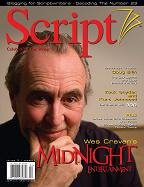There are scores of books out right now on how to write a great screenplay. Each one of them dishes out advice on structure, character, dialogue, blah blah blah. Some are more useful than others, true, but before you whip out your Borders or Barnes & Noble club cards, ask yourself: Have any of these self-proclaimed "experts" ever had one of their scripts actually produced?
(I throw that question out there with a bit of sarcasm. For here I, "The Unsung Critic," who may write somewhat condescendingly about other people's work, have yet to have any of my own work produced!)
I happen to believe that there is no gauranteed path to screenwriting success. No book or teacher can make you a great writer. Sure, they may impart wisdom and sage advice, but if you want to improve as a writer, sit down and write, write, write. Write until your mind hurts. Until your fingers are numb. And most importantly, get feedback on your writing. An objective, sincere opinion can do more wonders for improving your work than any class. (Even if it is that $10,000 class offered by Michael Wilde.)
Only you can make yourelf a great writer. But there are things -- easy and inexpensive to get -- that can make you a better writer.
 First, if you're looking to learn more about proper screenplay format, let me recommend THE SCREENWRITER'S BIBLE by David Trottier. (I've never met Trottier, so don't think that he's paying me to say this.) It's a really great resource in the technical part of screenwriting, from how to break down a scene to the nitty-gritty of writing descriptions and action -- most valuable to novice and spec script writers, though I still refer to it myself from time to time. It also has a very useful section on how to write a good query...
First, if you're looking to learn more about proper screenplay format, let me recommend THE SCREENWRITER'S BIBLE by David Trottier. (I've never met Trottier, so don't think that he's paying me to say this.) It's a really great resource in the technical part of screenwriting, from how to break down a scene to the nitty-gritty of writing descriptions and action -- most valuable to novice and spec script writers, though I still refer to it myself from time to time. It also has a very useful section on how to write a good query...Speaking of good queries, let me share with you Adam McDaniel's query for his script, HEAVEN SPENT. It's pretty well written, so much so that when it came time to publish the novel, the text was basically recycled for the book's back cover.
When Micah Cohen was five years old, he lost his parents to a horrible accident. He was convinced he would have died himself, had it not been for his guardian angel -- in the form of a little girl he never saw again.
Now, over twenty years later, Micah is living in the frenzy of Manhattan. With Christmas right around the corner and no one to share it with -- add a thankless job, no close family or friends, Micah believes that his life has become too hard, his existence too inconsequential. Sadly, he decides to end it all...but the attempt fails ridiculously.
That's just when Coltan pops up in the middle of Micah's living room. Possessing supernatural powers and a sadistic sense of humor, this bumbling "agent for
the afterlife" has come to collect Micah's soul. But there are two slight problems: Micah is still alive, and now has second thoughts about committing suicide. Reluctantly, Coltan must admit defeat.Rejuvenated by his new lease on life, Micah's determined to set things right. One good thing comes in the form of Christine, a young homeless woman he befriends. But soon Micah learns that she is more than she appears to be: his childhood guardian angel, now grown up. (Naturally, they can't help but risk upsetting the cosmic order of the universe by falling in love.)
Yet this happiness may be fleeting. Just as Micah realizes how wonderful his life has become, Coltan reappears to inform him that his days are now numbered -- for Death Itself is hunting Micah down. And so Christine, ever the dutiful protector, must prepare to do battle over Micah's soul.
Can she save him? What does Death have in store? And who -- or what -- is Coltan? Is he really working for Death as he claims, or a force far, far more terrifying?
HEAVEN SPENT is a darkly satirical, modern-day urban fairy tale concerning the adventures of a young man coming to terms with life, death, and all their crummy consequences.
I liked this query because it's clear, concise, has a bit of a dramatic buildup, and ends with a light touch of whimsy. It's not a summary of the story so much as a sly sales pitch, enticing people to actually want to read it. Best of all, it doesn't get too bogged down in describing all of the story's subplots, and it doesn't give everything away.
On that note, keep your own queries coming! After I get back from NYC I'll have a bit of time on my hands.
Small wonder.




